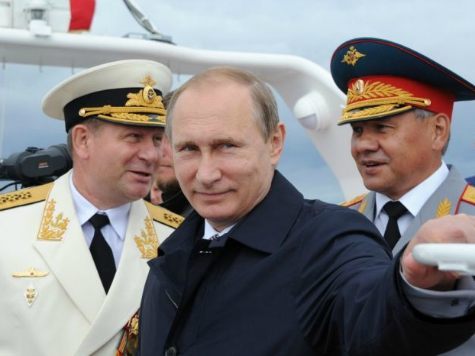A new doctrine issued by Russian President Vladimir Putin pushes for a “strong Russian presence” in the Atlantic even though the massive country does not touch the ocean.
Putin approved the measure at a meeting with Deputy Prime Minister Dmitry Rogozin, who despises NATO. Rogozin said the measure shows “changes in the international political situation and the objective strengthening of Russia as a great naval power.”
The new doctrine is in response to an expansion of NATO troops. However, The Associated Press did not mention that Russia’s political behavior was the impetus for NATO’s expansion, immediately following the invasion of Ukraine and threats to neighboring NATO countries.
Russian officials said Moscow is ready to protect Russian speakers in Latvia and Estonia. The Kremlin reopened cases against Lithuanians who refused to serve in the Soviet Army. Putin also praised the Molotov-Ribbentrop Pact, which split Poland between Germany and the USSR and allowed Josef Stalin to design what became the modern USSR after WWII.
Rogozin issued his own threat in May 2014 when he visited Transnistria, a strip of land that broke off from Moldova in 1990. He challenged Romania and Ukraine on Twitter because they would not allow his plane to fly in their airspace. His flight was sent back to Chisinau, where Moldovan officials searched his plane and “seized a list of names during the search and was analyzing them.” He tweeted a picture of the alleged petition with Moldovan secret services.
He managed to anger NATO when he told Romania, a NATO member, he would fly back in a UT-160, which is a Russian jet bomber. After he arrived in Moscow, he said, “Yes, gentlemen, Romanians, we’ll soon all explain who you are and what we think about you.”
Despite the threats, Russia has already established a presence in the Atlantic Ocean. Portugal, a member of the European Union and a founding member of NATO, chased a Russian ship out of its waters on November 6, 2014. Russia claims the ship was conducting “marine research,” but Portugal intervened when the ship floated almost fourteen miles from the coast.
Defense Minister Sergei Shoigu stated in November 2014 that the country planned for Russian long-range bombers to “patrol missions from the Arctic Ocean to the Caribbean and the Gulf of Mexico.” He insisted the expansion of NATO means Russia must “maintain military presence in the western Atlantic and eastern Pacific, as well as the Caribbean and the Gulf of Mexico.”
In June, Russian officials announced a new mission in the Atlantic Ocean. Large missile cruisers guided naval warships to the Atlantic, but no one provided details of the mission.
“In the coming days, a detachment of ships under the flag of Deputy Black Sea Fleet Commander Vice-Admiral Valery Kulikov will proceed past the Strait of Gibraltar and will begin to fulfill its objectives in the waters of the Atlantic ocean,” declared the Defense Ministry.
Russia is also forcing America to feel its presence in the Pacific. Putin called President Barack Obama to congratulate him on another year of American independence, but a few Russian bombers flew off the coast of Alaska and California on the same day. Air Force jets intercepted both flights before they entered US airspace.
“These are not unprecedented flights, but we are postured to respond whether Alaska or California,” said NORAD spokesman Michael Kucharek. “At no time did the bombers enter North American sovereign airspace.”
The doctrine also includes expanding Russia’s presence in Antartica. In May, Russian outlets reported that Russia’s navy will explore Antarctica by the end of 2015 for the first time in over 30 years. Navy spokesman Igor Dygalo told Russian media their “interests are scientific.” Scientists on the mission “will conduct hydrographic research in order to make amendments to marine and nautical maps, as well as practice guiding a vessel through the difficult waters, assessing the vessels capabilities to perform in the conditions of the Antarctic.” However, Dygalo did not explain why the navy and Defense Ministry are conducting the mission.

COMMENTS
Please let us know if you're having issues with commenting.